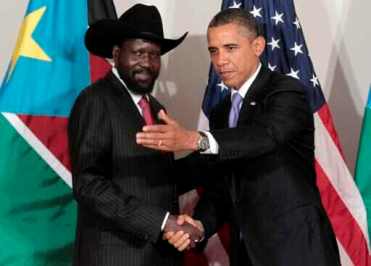US questioned Kiir’s ability to lead South Sudan post-independence: report
February 27, 2015 (WASHINGTON) – The administration of former US president George W Bush had serious doubts over the ability of South Sudanese leader Salva Kiir to lead his nation after independence, according to a report that appeared in Foreign Policy (FP) magazine.

The report included an account of the last meeting which took place in the White House in 2008 between Kiir and Bush before he left office.
Kiir was accompanied by the then Sudanese foreign minister Deng Alor Kuol and secretary-general of the Sudan People’s Liberation Movement (SPLM) Pagan Amum Okiech.
Bush’s team in the meeting included national security adviser Stephen Hadley, assistant secretary of state for African affairs Jendayi Frazer, as well as Bush’s special envoy to Sudan, Richard Williamson.
White House officials described the meeting as awkward, saying that the South Sudanese president was unable to explain to Bush his vision about an independent South Sudan and instead appeared “distracted”, deferring questions to his junior officials in “abdication of his responsibility”.
“The president [Bush] was trying to engage him on what they were doing internally, how they were building their ministries, how they were preparing for the referendum, but he [Kiir] kept just saying, ‘Pagan [Amum] will answer that,’ ‘Deng [Alor] will answer that,’” the report quoted officials who attended the meeting.
Kiir remained quiet throughout the meeting and allowed his aides to do most of the talking except at the end when he asked Bush to pledge that the US will defend South Sudan in case Khartoum attempted to disrupt the 2011 referendum.
“I need you, Mr President, to say that you will defend South Sudan automatically if the north invades, that the referendum has to go on, and that South Sudan exists under the security umbrella of the United States,” recalled Cameron Hudson, who was then the director for African affairs on the National Security Council (NSC).
“And Bush just wasn’t going to make that guarantee; he couldn’t make that guarantee,” the official who attended the meeting further recalled.
Kiir, the report said, had grown increasingly paranoid about a northern [Sudan] plot to derail the referendum and he worried that the US was not doing enough to ensure that implementation of the 2005 Comprehensive Peace Agreement (CPA) proceeded according to schedule.
However, the US president as well as putting pressure on Khartoum to allow the referendum to take place, was also concerned about the future of South Sudan and whether or not its leadership had a vision for the country.
Once Kiir had departed with his team, Bush and his team of Africa advisers paused for a moment of reflection on what Kiir and his officials had said during the meeting.
“Oh, my God, like how the hell are they going to run this place [South Sudan]? This is crazy. They have no vision,” the report quoted Bush’s officials.
The officials also blamed Kiir for “lying” to the incumbent president Obama denying the alleged support Sudanese rebels, which led to breakdown of trust between Washington and Juba.
When Obama raised the issue at a 2011 meeting, Kiir responded by suggesting the US check the accuracy of its satellites.
“I tell you, I almost fell off my chair,” former US special envoy Princeton Lyman said. “All of us on the American side, we couldn’t believe it.”
Under pressure from former US ambassador to the UN Susan Rice, Kiir sent a letter afterwards speaking of “new information” about the fighting across the border in Sudan.
But when Lyman and Denis McDonough, by then the deputy national security advisor, brought up the letter during a subsequent meeting in Juba, Kiir feigned ignorance. “What letter? What new information?” he asked, according to Lyman. “We don’t help them in South Kordofan or Blue Nile.”
“Denis was so angry,” Lyman recalled. “Having lost Obama, [Kiir] then lost Denis McDonough.”
(ST)
